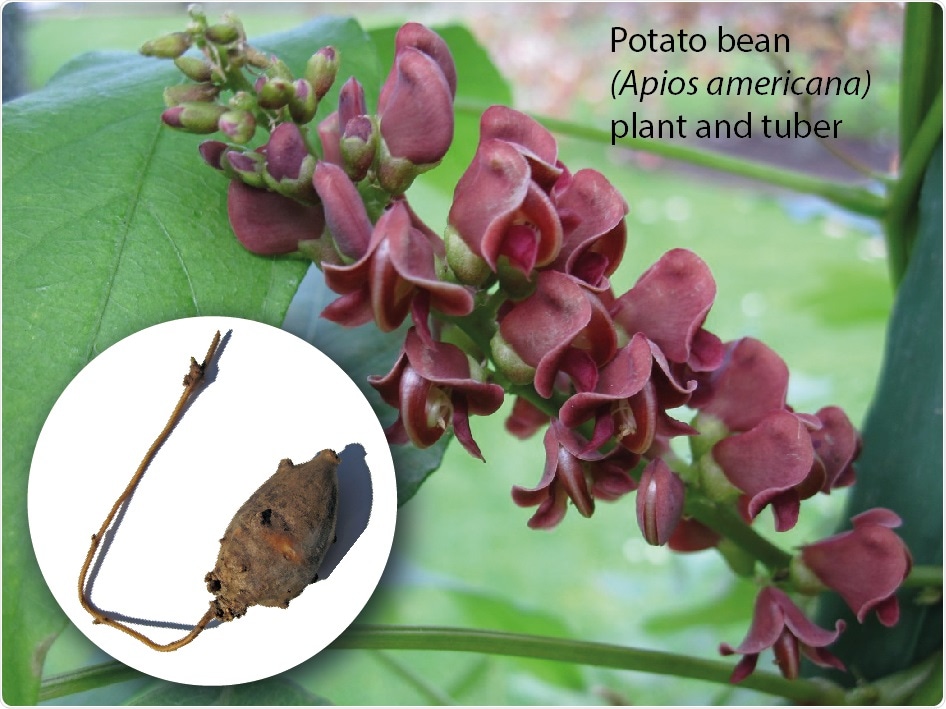Researchers have discovered that a plant native to America could also be grown in the United Kingdom, bringing with it immense benefits for a sustainable and balanced diet.

Image Credit: University of Aberdeen.
The potato bean, called Apios Americana, is high in protein and is often found in Colorado, Texas, and Florida. It was once a staple source of foraged food.
Scientists from the University of Aberdeen Rowett Institute, Scotland’s Rural College (SRUC), and Royal Botanic Garden Edinburgh (RBGE), examined the potato bean to find out whether it could be applied as part of a healthier and biodiverse protein-rich diet while possibly supporting the environment by being grown locally.
The study has been published in the Journal of Food Composition and Analysis and was financially supported by the Rural and Environmental Science and Analytical Services Division (RESAS) of the Scottish Government.
We studied the Apios Americana—or potato bean—as part of our research into novel and sustainable sources of protein and fibre in a bid to find alternatives and to diversify our dietary choices.”
Dr Madalina Neacsu, Rowett Institute
Dr Neacsu continued, “The majority of people’s protein intake in the UK currently comes from animal sources; however, if we could diversify our recommended dietary intake of protein from plant-based sources, such as the potato bean, this could contribute towards meeting climate targets as well as improving health.
“The potato bean has shown previously that it can adapt to a wide geographical range and has a high tolerance to a wide range of conditions, so it is able to grow in environments away from America.”
Wild species related to crops are an enormous resource for agriculture and the importance of conserving their genetic resources is a significant role for botanic gardens today. With the combination of taxonomic and horticultural expertise, we have a part to play in working with institutes with a focus on crop genetic resources.”
Dr Max Coleman, Royal Botanic Garden Edinburgh
Dr Coleman continued, “The potato bean is one example of the potential of wild plants to diversify our diet and build resilience in agriculture. There are an estimated 30,000 edible plants available to us and yet widespread consumption only involves about 150 of them. Just 12 crops provide 80% of our calories, meaning we rely on less than 1% of the food plants available to us. There is considerable exciting work ahead.”
For this analysis, the team had sourced Apios Americana from two growing locations in the United Kingdom; North and South, and methodically defined its chemical and nutritional content.
In particular, the researchers have determined the micronutrient (minerals and microelements), the macronutrient (protein, fat, and fiber), and the non-nutrient (bioactive phytochemicals) content of the tubers as well as all potential food and agricultural co-products like rhizomes, peel and leaves disclosing and discussing the potential this specific plant could have for diet revalorization and biodiversification.
The potential benefits of the potato bean are promising—it is a rich source of protein and fibre, representing a good way to boost fibre consumption with can be a struggle for many people.”
Dr Madalina Neacsu, Rowett Institute
Dr. Neacsu added, “We also found in Apios samples that it contained all the essential amino acids that we need to make proteins in the body. The peel and leaves are also a rich source of the bioactives which are normally found in superfruits such as berries.”
“Going forward, there seems to be definite potential in the implementation of new crops and foods being grown here in the UK that could help people maintain a more balanced diet. Further trials are now needed to gain more insight into the best way to grow and utilize Apios on a broader scale, taking into account its perennial growth habit and the potential to use its foliage and seeds as well as the tubers,” Dr. Robin Walker from Scotland’s Rural College concluded.
Source:
Journal reference:
Neacsu, M., et al. (2021) Nutritional and chemical profiling of UK-grown potato bean (Apios Americana Medik) reveal its potential for diet biodiversification and revalorisation. Journal of Food Composition and Analysis. doi.org/10.1016/j.jfca.2021.103821.